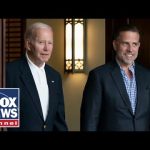In recent developments, a House subcommittee has unearthed evidence suggesting that COVID-19 likely originated from a laboratory in Wuhan, China. This isn’t just some conspiracy theory; the findings indicate that the virus exhibited characteristics that simply cannot be found in nature. It’s a revelation that has many scratching their heads, wondering why it took so long to get to this point. The committee’s insights cast a shadow on some of the pandemic’s earlier guidance, which was heavily reliant on social distancing and mask-wearing—a strategy that now appears to lack substantial backing from actual data.
Adding fuel to the fire, John Elliot, a former national security aide under Trump and an author, weighed in on the findings. He commented on how the head of the National Institute of Allergy and Infectious Diseases, Dr. Anthony Fauci, has been all over the map when it came to providing clear guidance. Remember the mask chaos? First, it was wear one. Then, wear two. Next, maybe don’t wear any at all. Elliot pointed out that when questions arose about the virus’s origins, Fauci’s evasiveness on whether the virus was lab-created was quite telling. The new report reinforces the doubts that many had regarding the virus’s true origins, suggesting it’s an outcome of experiments funded, ironically, by U.S. taxpayers.
As Americans express weariness from pandemic fatigue, there are calls for accountability. Families have suffered throughout this ordeal, unable to visit loved ones confined in senior homes for far too long. With Republicans anticipating a stronger hold on Congress after the recent elections, many believe that oversight will intensify. Elliot suggests that Congress is likely to investigate further, ensuring that such a crisis does not repeat itself. The hope is that policies based on dubious science do not govern pandemic responses in the future.
Talk has also turned to the volatile situation in the Middle East, specifically regarding President Trump’s desire for a ceasefire and a hostage deal in Gaza before taking office. Trump’s previous administration was marked by stringent actions against adversaries, and there is an expectation that he will apply similar tactics upon returning to office, potentially holding hostile forces accountable. A significant shift is anticipated in how the U.S. approaches international negotiations, with Trump at the helm ready to assert American power and influence.
Meanwhile, Ukrainian President Zelenskyy has expressed a willingness to negotiate peace conditions with Russia, hoping to solidify Ukraine’s position within NATO. However, many see this pursuit as improbable, especially since NATO allies have made it crystal clear that membership isn’t on the table. But with Trump’s knack for deal-making, supporters believe that he would engage both sides to reach constructive agreements rather than escalating arms supplies, which may prove counterproductive in negotiations.
With these unfolding events, the nation stands at a crossroads, trying to navigate through the chaos left behind by the pandemic and geopolitical conflicts. One thing is for certain—whether it’s the origins of COVID-19 or tensions in the Middle East, there is a growing demand for clarity and decisive action to avoid repeating past mistakes. As we look toward future leadership, Americans are hoping for leaders who will not only listen but also deliver effective solutions based on solid evidence.




